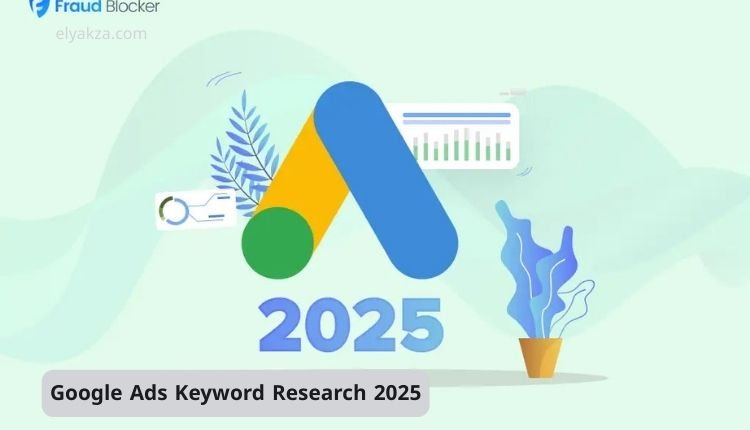As 2025 approaches, the digital advertising landscape is undergoing rapid transformations, and Google Ads remains at the forefront of these developments. To ensure the success of your campaigns and achieve maximum Return on Investment (ROI), understanding and applying advanced keyword research techniques has become indispensable. It’s no longer just about selecting specific words; it has evolved into an art and a science based on a deeper understanding of user intent.
قائمة المحتويات
In this comprehensive guide, we will take you on a detailed journey through everything you need to know to set up and optimize your Google Ads campaigns in 2025, with a particular focus on the growing importance of keyword research as the cornerstone of any successful strategy.
Understanding Google Ads Keyword Match Types: Fundamental Shifts for 2025
If you’re new to Google Ads, you might not be aware of the significant changes that have occurred over the last few years regarding how Google handles keyword matching.
From Words to Meaning
Google now targets the meaning of the keyword phrase, not just the exact words you enter. This concept is incredibly important and will become even more crucial over time.
Historically, match types (exact match, phrase match, and broad match) operated rigidly. For example, the exact match keyword “furniture store” would only trigger ads if searched in that precise order.
Now, searches like:
- home furnishing store
- stores where I can buy sofas
- couch stores
can all trigger your ad because they align with the broader meaning of “furniture.”
Phrase Match vs Exact Match
Phrase match has diminished in importance because exact match now incorporates meaning. For new campaigns, it’s better to focus on:
- Exact Match
- Broad Match
Broad Match in 2025
Broad match has expanded even further and now includes related terms. Since 15% of all Google searches are brand new, advertisers are encouraged to start with broad match keywords of 3–5 words.
Examples:
- Instead of furniture store, use affordable living room furniture store.
- Instead of home decor, use modern home decor for apartments.
“Read Also: Google Workspace vs. Microsoft 365“
The Shift Towards Meaning and Intent-Based Targeting
The transformation in Google Ads (إعلانات جوجل) reflects how humans are evolving in their search for information.
Instead of typing short terms, users increasingly search in conversational and natural language.
For example:
- Past: home furniture
- Now: where can I buy a dining table for my living room?
Google now connects these longer conversational queries with broader meanings, ensuring ads are shown for relevant intent.
This means advertisers must:
- Think deeply about user intent.
- Go beyond surface-level keywords.
- Craft keyword strategies that reflect how people talk and ask questions.
Step-by-Step Keyword Research Using Google Keyword Planner
Now let’s move on to the process of conducting keyword research using Google Keyword Planner.

1. Starting with a Core Idea
- Begin with 3–4 core keywords that are highly relevant to your business.
- Note them in a document or Google Notes as your foundation.
2. Accessing Keyword Planner
- Sign in to Google Ads.
- Navigate to Tools & Settings → Keyword Planner.
- Choose Discover New Keywords.
3. Entering Keywords & Website
- Add up to 10 initial keywords.
- Enter your website URL for tailored suggestions.
- Click Get Results.
“Read Also: Google Ads Campaign“
Analyzing Keyword Planner Data: Reading Beyond the Numbers
Once you get results, the Keyword Planner provides valuable insights:
- Keywords You Provided – your initial entries.
- Keyword Ideas – hundreds of suggestions from Google.
- Average Monthly Searches – frequency of search queries.
- Trends – monthly and yearly shifts.
- Competition – low, medium, or high.
- Top of Page Bid Range – estimated CPC to rank at the top.
👉 Focus on:
- 1–2 broad match, long-tail keywords (3–5 words).
- Highly relevant exact match keywords.
“Read Also: How to Run Google Ads“
Refining and Organizing Your Keywords
After reviewing the suggestions, refine your keyword list.
Filtering and Exclusion
- Remove irrelevant locations or terms.
- Example: If targeting Seminyak, Bali, exclude Canggu or Kuta if they’re irrelevant.
Removing Unwanted Keywords
- Exclude competitor names.
- Remove irrelevant phrases.
Spelling Variations
- Google treats numbers/words the same (1 bedroom = one bedroom).
Reviewing Costs
- If CPC is beyond budget, exclude those keywords.
After filtering, export your refined list to CSV or Google Sheets.
“Read Also: Google Local Service Ads“
Structuring Campaigns and Ad Groups
Now, organize your keyword list into an effective structure.
1. Clean the Spreadsheet
- Delete unnecessary columns.
- Add “Campaign” and “Ad Group.”
2. Group by Theme
Example:
- One-Bedroom Villa Campaign
- Ad Group: Luxury One-Bedroom Villas
- Ad Group: Villas for Rent
- Two-Bedroom Villa Campaign
- Ad Group: Villas with Sea View
- General Campaign
- Ad Group: Villas for Rent in Bali
3. Add Data
Keep monthly searches, competition, and CPC data next to each keyword.
4. Documentation
If working with clients, this organized sheet helps secure approval and transparency.
Continuous Optimization and Keyword Refinement

Keyword research is not a one-time task. It requires continuous review and refinement.
Key practices include:
- Tracking keyword performance regularly.
- Reviewing Search Term Reports to add or exclude terms.
- Adding negative keywords to block irrelevant searches.
- Adjusting bids and keyword lists based on real user data.
👉 Flexibility and adaptability are essential to remain competitive in 2025.
Conclusion: Mastering Keyword Research for a Successful Advertising Future
Keyword research in 2025 is more critical than ever, but with a new focus: meaning and intent-based targeting.
Success requires:
- Leveraging exact match and long-tail broad match.
- Using Keyword Planner strategically.
- Structuring campaigns for maximum clarity and ROI.
- Continuously optimizing based on performance.
By mastering these principles, you’ll be well-prepared to maximize your ROI and thrive in the evolving Google Ads landscape of 2025.
David Elon is a writer focused on Google services and tools, offering practical guides and tutorials on how to maximize the potential of platforms like Google Ads, Google Analytics, Google Drive, and Google Workspace.
Through his content, David helps readers—from beginners to professionals—understand how to use Google’s ecosystem efficiently for both personal productivity and business growth. He covers tips, best practices, and case studies that make the most out of Google’s features.
David’s approach combines technical know-how with easy-to-follow instructions, making his work a trusted resource for entrepreneurs, marketers, and students alike. His passion lies in enabling users to harness the full power of Google’s tools to achieve their goals.

